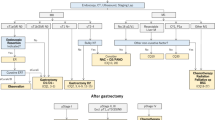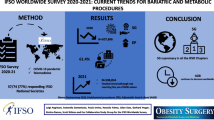Abstract
Purpose
This study aims to systematically review and meta-analyze the evidence on the risk of esophageal adenocarcinoma (EAC) following metabolic and bariatric surgery (MBS).
Materials and Methods
A systematic literature search was conducted on the China National Knowledge Infrastructure (CNKI), Wanfang, EMBASE, MEDLINE, Web of Science, The Cochrane Library, and PubMed databases. Meta-analysis utilized odds ratios (ORs) and 95% confidence intervals (CIs) to analyze the correlation between MBS and the risk of EAC. Meta-analysis was performed using STATA software (version 12.0).
Results
Fourteen studies involving patients with obesity undergoing bariatric surgery and control groups receiving conventional treatment were included. The meta-analysis indicated a reduction in the overall incidence of esophageal cancer after bariatric surgery (OR = 0.69, 95% CI: 0.51–0.95, P = 0.022). Subgroup analysis results demonstrated a decreased risk of EAC in European patients with obesity undergoing MBS treatment (OR: 0.60, 95% CI: 0.38–0.95, P = 0.028). In studies with a sample size greater than or equal to 100,000 patients, the risk of EAC in patients with obesity undergoing MBS was significantly lower than the non-surgery group (OR: 0.59, 95% CI: 0.42–0.83, P = 0.003). Articles published before 2020 and those published in 2020 or earlier showed a significant difference in the incidence of EAC between the surgery and non-surgery groups (OR: 0.57, 95% CI: 0.43–0.75, P < 0.001). The risk of EAC in patients with obesity with a follow-up time of less than 5 years was statistically significant (OR: 0.46, 95% CI: 0.25–0.82, P = 0.009).
Conclusion
Our meta-analysis results suggest a reduced risk of esophageal cancer in patients with obesity after bariatric surgery.
PROSPERO Registration
CRD 42024505177.
Graphical Abstract





Similar content being viewed by others
Data Availability
Some or all data, models, or code generated or used during the study are available from the corresponding author by request.
References
Koliaki C, Dalamaga M, Liatis S. Update on the obesity epidemic: after the sudden rise, is the upward trajectory beginning to flatten? Curr Obes Rep. 2023;12(4):514–27.
Avgerinos KI, Spyrou N, Mantzoros CS, et al. Obesity and cancer risk: emerging biological mechanisms and perspectives. Metabolism. 2019;92:121–35.
Guevara-Aguirre J, Rosenbloom AL. Obesity, diabetes and cancer: insight into the relationship from a cohort with growth hormone receptor deficiency. Diabetologia. 2015;58(1):37–42.
Divella R, Gadaleta Caldarola G, Mazzocca A. Chronic inflammation in obesity and cancer cachexia. J Clin Med. 2022;11(8):2191.
Cani PD, Jordan BF. Gut microbiota-mediated inflammation in obesity: a link with gastrointestinal cancer. Nat Rev Gastroenterol Hepatol. 2018;15(11):671–82.
Harvey SV, Wentzensen N, Bertrand K, et al. Associations of life course obesity with endometrial cancer in the Epidemiology of Endometrial Cancer Consortium (E2C2). Int J Epidemiol. 2023;52(4):1086–99.
Nam GE, Cho KH, Han K, et al. Obesity, abdominal obesity and subsequent risk of kidney cancer a cohort study of 233 million East Asians. Br J Cancer. 2019; 121(3):271–7
Sun M, Fritz J, Häggström C, et al. Metabolically (un)healthy obesity and risk of obesity-related cancers: a pooled study. J Natl Cancer Inst. 2023;115(4):456–67.
Kulkarni A, Bowers LW. The role of immune dysfunction in obesity-associated cancer risk, progression, and metastasis. Cell Mol Life Sci. 2021;78(7):3423–42.
Zhang ZZ, Wang L, Wang X, et al. Interpretation for indications of metabolic and bariatric surgery released by ASMBS and IFSO in 2022. Zhonghua Wei Chang Wai Ke Za Zhi. 2023;26(4):385–8.
Eisenberg D, Shikora SA, Aarts E, et al. 2022 American Society of Metabolic and Bariatric Surgery (ASMBS) and International Federation for the Surgery of Obesity and Metabolic Disorders (IFSO) indications for metabolic and bariatric surgery [published correction appears in Obes Surg. 2022 Nov 29]. Obes Surg. 2023;33(1):3–14.
Crafts TD, Tonneson JE, Wolfe BM, et al. Obesity and breast cancer: preventive and therapeutic possibilities for bariatric surgery. Obesity (Silver Spring). 2022;30(3):587–98.
Aubrey C, Black K, Campbell S, et al. Endometrial cancer and bariatric surgery: a scoping review. Surg Obes Relat Dis. 2019;15(3):497–501.
Pararas N, Pikouli A, Dellaportas D, et al. The protective effect of bariatric surgery on the development of colorectal cancer: a systematic review and meta-analysis. Int J Environ Res Public Health. 2023;20(5):3981.
D’Amato S, Sofia M, Agosta M, et al. The impact of bariatric surgery on colorectal cancer risk. Surg Obes Relat Dis. 2023;19(2):144–57.
Mackenzie H, Markar SR, Askari A, et al. Obesity surgery and risk of cancer. Br J Surg. 2018;105(12):1650–7.
Lazzati A, Poghosyan T, Touati M, et al. Risk of esophageal and gastric cancer after bariatric surgery. JAMA Surg. 2023;158(3):264–71.
Plat VD, Kasteleijn A, Greve JWM, et al. Esophageal cancer after bariatric surgery: increasing prevalence and treatment strategies. Obes Surg. 2021;31(11):4954–62.
Musella M, Berardi G, Bocchetti A, et al. Esophagogastric neoplasms following bariatric surgery: an updated systematic review. Obes Surg. 2019;29(8):2660–9.
Bevilacqua LA, Obeid NR, Yang J, et al. Incidence of GERD, esophagitis, Barrett’s esophagus, and esophageal adenocarcinoma after bariatric surgery. Surg Obes Relat Dis. 2020;16(11):1828–36.
Tse WHW, Kroon HM, van Lanschot JJB. Clinical challenges in upper gastrointestinal malignancies after bariatric surgery. Dig Surg. 2018;35(3):183–6.
Page MJ, McKenzie JE, Bossuyt PM, et al. The PRISMA 2020 statement: an updated guideline for reporting systematic reviews. J Clin Epidemiol. 2021;134:178–89.
Stroup DF, Berlin JA, Morton SC, et al. Meta-analysis of observational studies in epidemiology: a proposal for reporting. Meta-analysis Of Observational Studies in Epidemiology (MOOSE) group. JAMA. 2000;283(15):2008–12.
Stang A. Critical evaluation of the Newcastle-Ottawa scale for the assessment of the quality of nonrandomized studies in meta-analyses. Eur J Epidemiol. 2010;25(9):603–5.
Adams TD, Stroup AM, Gress RE, et al. Cancer incidence and mortality after gastric bypass surgery. Obesity (Silver Spring). 2009;17(4):796–802.
Maret-Ouda J, Tao W, Mattsson F, et al. Esophageal adenocarcinoma after obesity surgery in a population-based cohort study. Surg Obes Relat Dis. 2017;13(1):28–34.
Schauer DP, Feigelson HS, Koebnick C, et al. Bariatric surgery and the risk of cancer in a large multisite cohort. Ann Surg. 2019;269(1):95–101.
Tao W, Santoni G, von Euler-Chelpin M, et al. Cancer risk after bariatric surgery in a cohort study from the five Nordic countries. Obes Surg. 2020;30(10):3761–7.
Tsui ST, Yang J, Zhang X, et al. Development of cancer after bariatric surgery. Surg Obes Relat Dis. 2020;16(10):1586–95.
Khalid SI, Maasarani S, Wiegmann J, et al. Association of bariatric surgery and risk of cancer in patients with morbid obesity. Ann Surg. 2022;275(1):1–6.
Andalib A, Bouchard P, Demyttenaere S, et al. Esophageal cancer after sleeve gastrectomy: a population-based comparative cohort study. Surg Obes Relat Dis. 2021;17(5):879–87.
Aminian A, Wilson R, Al-Kurd A, et al. Association of bariatric surgery with cancer risk and mortality in adults with obesity. JAMA. 2022;327(24):2423–33.
Esparham A, Shoar S, Mehri A, et al. Bariatric surgery and risk of hospitalization for gastrointestinal cancers in the USA: a propensity score matched analysis of National Inpatient Sample Study. Obes Surg. 2023;33(12):3797–805.
Desai D, Singhal S, Koka J. Evaluating the correlation of bariatric surgery and the prevalence of cancers in obese patients: a study of the National Inpatient Sample (NIS) database. Cureus. 2022;14(4):e23976.
Hardvik Åkerström J, Santoni G, von Euler CM, et al. Decreased risk of esophageal adenocarcinoma after gastric bypass surgery in a cohort study from 3 Nordic countries. Ann Surg. 2023;278(6):904–9.
Chittajallu V, Mansoor E, Perez J, et al. Association of bariatric surgery with risk of incident obesity-associated malignancies: a multi-center population-based study. Obes Surg. 2023;33(12):4065–9.
Amin MN, Hussain MS, Sarwar MS, et al. How the association between obesity and inflammation may lead to insulin resistance and cancer. Diabetes Metab Syndr. 2019;13(2):1213–24.
Schlottmann F, Dreifuss NH, Patti MG. Obesity and esophageal cancer: GERD, Barrett’s esophagus, and molecular carcinogenic pathways. Expert Rev Gastroenterol Hepatol. 2020;14(6):425–33.
Heber D. Interrelationships of high fat diets, obesity, hormones, and cancer. Adv Exp Med Biol. 1996;399:13–25.
Ye XY, Lai YT, Song WP, Hu Y. The research progress on the association between dietary habits and esophageal cancer: a narrative review. Ann Palliat Med. 2021;10(6):6948–56.
Li R, Sun J, Wang T, et al. Comparison of secular trends in esophageal cancer mortality in China and Japan during 1990–2019: an age-period-cohort analysis. Int J Environ Res Public Health. 2022;19(16):10302.
Balsiger BM, Murr MM, Poggio JL, et al. Bariatric surgery. Med Clin North Am. 2000;84(2):477–89.
Colquitt J, Clegg A, Sidhu M, et al. Surgery for morbid obesity. Cochrane Database Syst Rev, 2003;(2):Cd003641.
Favretti F, Cadière GB, Segato G, et al. Laparoscopic banding: selection and technique in 830 patients. Obes Surg. 2002;12(3):385–90.
Baltasar A, Bou R, Miró J, et al. Laparoscopic biliopancreatic diversion with duodenal switch: technique and initial experience. Obes Surg. 2002;12(2):245–8.
Paiva D, Bernardes L, Suretti L. Laparoscopic biliopancreatic diversion: technique and initial results. Obes Surg. 2002;12(3):358–61.
Nguyen NT, Nguyen B, Gebhart A, et al. Changes in the makeup of bariatric surgery: a national increase in use of laparoscopic sleeve gastrectomy. J Am Coll Surg. 2013;216(2):252–7.
Luna Aufroy A, Rebasa Cladera P, Montmany Vioque S. Barrett’s esophagus and esophageal cancer after sleeve gastrectomy Myth or reality? Cir Esp (Engl Ed). 2023;101(Suppl 4):S39-42.
Masood M, Low D, Deal SB, et al. Gastroesophageal reflux disease in obesity: bariatric surgery as both the cause and the cure in the morbidly obese population. J Clin Med. 2023;12(17):5543.
Genco A, Castagneto-Gissey L, Lorenzo M, et al. Esophageal adenocarcinoma after sleeve gastrectomy: actual or potential threat? Italian series and literature review. Surg Obes Relat Dis. 2021;17(5):848–54.
Chen ZW, Jin T, Liang PP, et al. Incidence of cancer for patients after bariatric surgery: evidence from 33 cohort studies. Surg Obes Relat Dis. 2023, 27:S1550–7289(23)00801-8.
Wilson RB, Lathigara D, Kaushal D. Systematic review and meta-analysis of the impact of bariatric surgery on future cancer risk. Int J Mol Sci. 2023;24(7):6192.
Courcoulas AP. Bariatric surgery and cancer risk. JAMA. 2022;327(24):2400–2.
Funding
This work was supported by the Natural Science Foundation of Gansu Province (grant number 23JRRA1317, 23JRRA1782).
Author information
Authors and Affiliations
Contributions
ZCL and LWH made substantial contributions to the conception and design for this work. ZCL and PLZ collected all the data. ZCL and LWH were the major contributors in writing the manuscript. ZCL and HDP performed the critical revision for this manuscript. All authors contributed to the article and approved the submitted version.
Corresponding author
Ethics declarations
Ethical Approval
This article does not contain any studies with human participants or animals performed by any of the authors.
Informed Consent
Informed consent does not apply.
Competing Interests
The authors declare no competing interests.
Additional information
Publisher's Note
Springer Nature remains neutral with regard to jurisdictional claims in published maps and institutional affiliations.
Key Points
• Question: Is there an association between bariatric surgery and the incidence of esophageal cancer?
• Findings: In this meta-analysis, a total of 4,665,963 patients were included (1,081,152 patients who underwent bariatric surgery and 3,584,811 matched non-surgery control group patients). Bariatric surgery was significantly associated with a lower risk of esophageal cancer (OR = 0.69, 95% CI: 0.51–0.95, P = 0.022).
• Meanings: Among patients with obesity, bariatric surgery is associated with a significantly reduced incidence of esophageal cancer compared to non-surgical interventions.
Rights and permissions
Springer Nature or its licensor (e.g. a society or other partner) holds exclusive rights to this article under a publishing agreement with the author(s) or other rightsholder(s); author self-archiving of the accepted manuscript version of this article is solely governed by the terms of such publishing agreement and applicable law.
About this article
Cite this article
Zhu, C., Liu, W., Hu, D. et al. Risk of Esophageal Adenocarcinoma After Bariatric Surgery: A Meta-Analysis of Retrospective Studies. OBES SURG 34, 1726–1736 (2024). https://doi.org/10.1007/s11695-024-07190-9
Received:
Revised:
Accepted:
Published:
Issue Date:
DOI: https://doi.org/10.1007/s11695-024-07190-9




